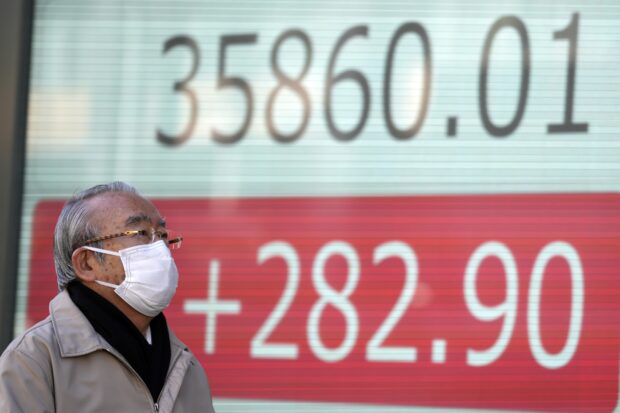
A person walks in front of an electronic stock board showing Japan’s Nikkei 225 index at a securities firm Monday, Jan. 15, 2024, in Tokyo. (AP Photo/Eugene Hoshiko)
HONG KONG — Asian shares were mostly higher on Monday, with Tokyo extending its New Year rally, as China’s central bank kept its one-year policy loan interest rate unchanged.
U.S. futures and oil prices gained.
China’s central bank opted to keep its one-year policy loan interest rate at 2.5 percent on Monday while injecting funds into the financial system. That surprised market observers since it was contrary to the anticipated trend of lowering borrowing costs to stimulate the economy.
The “Policy focus has shifted to the effectiveness of monetary policy,” Zhaopeng Xing and Raymond Yeung of ANZ said in a report. “Today’s hold means the chance of an RRR (reserve ratio requirement) cut in February is higher.”
READ: China central bank surprises markets, leaves medium-term rate unchanged
The Hang Seng in Hong Kong slipped 0.2 percent to 16,219.55, while the Shanghai Composite index was up 0.4 percent, at 2,892.28.
Search engine provider Baidu slumped 8.6 percent after a local newspaper report alleged the company’s Ernie AI platform was linked to Chinese military research into artificial intelligence. Baidu said in a statement that it “has no affiliation or other partnership with the academic institution in question.”
Tokyo’s Nikkei 225 rose 1.1 percent to 35,955.00 and the Kospi in South Korea edged 0.1 percent higher to 2,526.72.
Ruling-party candidate Lai Ching-te emerged victorious in Taiwan’s presidential election on Saturday, a result that will determine the trajectory of the self-ruled democracy’s contentious relations with China over the next four years. The Democratic Progressive Party, to which Lai belongs, has consistently rejected China’s assertions of sovereignty over Taiwan.
Taiwan’s Taiex gained 0.5 percent to 17,604.72.
Australia’s S&P/ASX 200 also edged 0.1 percent higher, to 7,502.70.
Dow Jones, Nasdaq and S&P 500
On Friday, the S&P 500 edged up by 0.1 percent, the Dow Jones Industrial Average fell 0.3 percent , dragged down by a sharp loss for UnitedHealth Group following its results. The Nasdaq was basically flat and rose by less than 0.1 percent.
Stocks have been roaring toward records for months, pulling the S&P 500 within 0.3 percent of its all-time high, on hopes that inflation is cooling enough for the Federal Reserve to cut interest rates several times this year.
Treasury yields have already sunk in the bond market on those expectations, and they fell further after a report showed inflation at the U.S. wholesale level was weaker last month than economists expected. The data bolstered expectations for rate cuts a day after another report had shown inflation was warmer at the consumer level than expected.
The yield on the 10-year Treasury eased to 3.94 percent from nearly 4 percent just before the report’s release. In October, it was above 5 percent and at its highest level since 2007. Easier rates and yields relax the pressure on the economy and financial system, while boosting prices for investments.
READ: Fed rate cuts may wait as inflation ticked up in December
Traders are largely betting on the Fed cutting its main interest rate six or more times through 2024. That would be a much more aggressive track than the Fed itself has hinted. It’s even cautioned it could raise rates further if inflation refuses to buckle convincingly toward its target of 2 percent. The federal funds rate is already at its highest level since 2001.
The reporting season for the end of 2023 unofficially got underway last Friday with a bevy of reports from banks.
Delta Air Lines sank 9 percent even though it reported stronger profit and revenue for the final three months of 2023 than analysts had forecast. The carrier’s forecasted range for upcoming full-year profit indicated it could fall below what analysts had been expecting.
The airline and other travel-related companies were also hurt by a rise in oil prices, which put pressure on their fuel costs. United Airlines fell 10.6 percent , and Norwegian Cruise Line Holdings lost 4.3 percent .
Crude prices continued to rise on last week’s gains amid worries about potential disruptions to supplies after Yemen’s Houthi rebels vowed fierce retaliation for U.S. and U.K. strikes against them. A barrel of benchmark U.S. crude oil rose 10 cents to $72.78. Brent crude, the international standard, rose 18 cents to $78.47 per barrel.
The U.S. dollar was at 145.16 Japanese yen, up from 144.92. The euro rose to $1.0964 from $1.0950.

